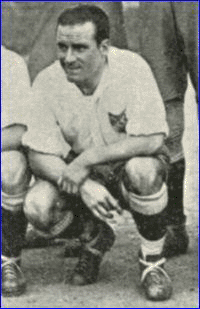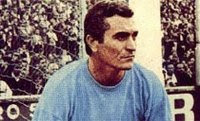 Shy, humble, noble heart ... So remind those who knew him: a player who went through life like lightning. His commitment to the community made him a key part of Barcelona in the early 50's, last heyday of the entity until 1973. Bosch fan Kubala, could live with his idol and sports merit even allowed to follow the selection FIFA.
Shy, humble, noble heart ... So remind those who knew him: a player who went through life like lightning. His commitment to the community made him a key part of Barcelona in the early 50's, last heyday of the entity until 1973. Bosch fan Kubala, could live with his idol and sports merit even allowed to follow the selection FIFA. A bright and clear Sunday, those in which, in the old field of Corts, FC Barcelona played at three in the afternoon, surprised the usual presence in the Barca half a kid named Andrew Bosch Pujol . The year was 1951 (the little boy was 20) and Barca faced his great rival city, the RCD English. Very few players are able to convince everyone as it did that day, the boy who only a week earlier was still ranked in the subsidiary, then called Industrial Spain. In the above output, the Canaries had played for Barcelona against UD Las Palmas and the average had formed Mariano Gonzalvo (Gonzalvo III) -One of the classics in the history 'Barça', a captain in the famous season-five cups and Joaquin Brugué, another girl the same age as Bosch, but it was actually a defense and, subsequently, be entrenched in behind the center of Barcelona, \u200b\u200bwhen he had to make up another large Gustau Biosca.
But that day in Las Palmas, the test had been successful. The coach, Fernando Slovak Daucik, then a brother-Kubala, he looked slightly disoriented, doubtful ... Maybe that's why Captain Gonzalvo dared to suggest: "Mister, the subsidiary have a kid that plays inside but that could very well adapted to the post of media. Why do not you call? "
And Daucik did. He called the boy and made him play half a wheel beside Gonzalvo III. A success. I did not move from ownership. First with the captain. And later , with Flotats, the unfailing phenomenon marker Di Stefano.
At that time, teams could count on youth teams (under 18 years), potential fans and the team also had a subsidiary. In Barca Spain was the Industrial, a leading name in the neighborhood located Hostafrancs, Pegaditas to Sants and Corts, Barcelona roots undoubtedly neighborhoods. The Industrial Spain had, at the headquarters of the firm, with a great field of grass, to the delight of locals and visitors. Ground was in perfect condition in which young people were hoping to jump into the first team. As with our man in question, with grace, Manchon and so on.
Indeed, the Industrial Spain did qualify for promotion to First Division 1952-53 season, abandoning it for being a reserve team. Three years later, he won that place of privilege and then the FC Barcelona decided to change the statutes, the team officially dissociate itself from the tutelage Barca and renamed the Sports Club Barcelona, \u200b\u200bwhich could play in the Primera sharing with Barcelona Nou Camp. When the teams met, in Barcelona in the local condition, it was his players who usually occupy the dressing room for FC Barcelona. Tied to one, a result that significantly hurt the club. But no one wanted to tarnish the least the fact, rather than the simple assumption of fair play. Today the task of training that Industrial Spain, would later be called Barcelona Atlètic, he keeps the one we know as Barça B. Pujol Andreu Bosch
had arrived for the first team recommended Gonzalvo III and blessed by Fernando Daucik. There born in Barcelona on April 22, 1931, the son of another Andreu Bosch also Barça player between 1922 and 1929, winning just the first League Cup in Spain, 1928-29. Bosch father came to play, dressed in Barca, 114 matches and scored nine goals. His son, from 1951 to 1960, participated in 221 matches and 22 goals signed. But it is difficult to reach and kiss the holy how did Bosch. He debuted on December 30, 1951, winning the English, 2-0. And at the end of the season, had already proclaimed champions of Copa America Cup and the Copa Eva Duarte. The latter without playing it, since they had to contest the Champions League and Cup, and like Barca had scored the two titles ... A type of alignment that season was comprised of: Ramallets, Martin, Biosca, Seguer; Gonzalvo III, Bosch, Basora, César, Vila, Kubala and Manchon.
Just a year and three months after its debut in the elite, the March 19, 1953, precisely against Belgium in Barcelona, \u200b\u200bAndreu Bosch international debut as a English team which also featured Garay. In his second international against Argentina (Buenos Aires, July 5, 1953) who made his debut was nothing more and nothing less than Ladislao Kubala, Bosch youth hero, and who idolized rather than admired. So much so that, once, a fellow Barca half joking and half serious, came to yelling "Hey ... that we play well." And is that Bosch, as he received the ball had eyes only for his revered Laszi. In total, the media scene played eight games with the national team: both above and against Chile, Sweden, Turkey, France, Egypt and Germany.
In his nine years at the club they won four league titles, four FA Cups in Spain, America Cup, two Fairs Cups and two Eva Duarte. All those who saw him play remember his class, his temper, his natural stride and participation in a comprehensive football rewarded primarily collective. And those who played beside him, his companions speak of his great heart, his humility, a certain shyness and spirit of camaraderie ... that despite undisguised predilection for Kubala. But even when he was a dedicated player-which as we have said occurred almost immediately, did not cut an inch if I had to ask his mentor, Gonzalvo III, during a party: "Have I done right? Am I well located? ". Bosch
in football began in the modest Gurugú and from there Joy Deportivo, Barcelona fans, Spain Industrial, FC Barcelona (first team), Real Betis and Elche CF. Then suffered a terrible car accident that kept him a time of uncertainty in the ICU and to sequelae, further complicated by a kidney disease that forced him to undergo regular dialysis. In the final tribute in the town of Granollers Barcelona was devoted to five cups, and it was very faded and could not stay for lunch they were offered. On December 17, 2004, received the spiritual help of the Holy Oils, and was buried in the cemetery of the same Granollers.
In fact, Bosch Pujol Andreu did everything fast. Came to the top at an early age, succeeded immediately and had health problems, too young.








 The theory is an explanation of the facts we have registered significant and that judge (innocently or negligently) explained. The theory can also be the questions we ask about the facts and questions raised by the explanations of those facts. a theory without facts, without a discernible correlation can be empty talk. Explanations of nothing or there are many theories about unicorns, and certainly are more poets field of professionals to serve their customers.
The theory is an explanation of the facts we have registered significant and that judge (innocently or negligently) explained. The theory can also be the questions we ask about the facts and questions raised by the explanations of those facts. a theory without facts, without a discernible correlation can be empty talk. Explanations of nothing or there are many theories about unicorns, and certainly are more poets field of professionals to serve their customers. 




